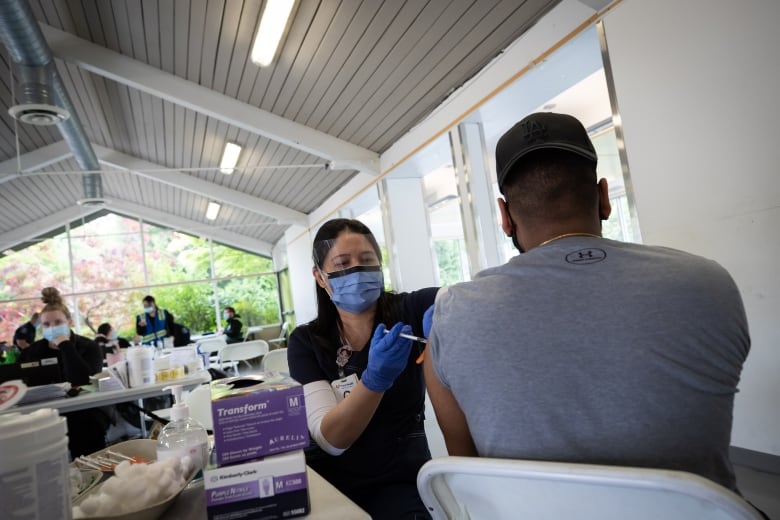Experts weigh in on possible factors behind vaccine hesitancy
'Shame is not helpful in this conversation,' says vaccine safety scientist

EDITOR'S NOTE: This story has been updated to better reflect a range of reasons behind COVID vaccine hesitancy. A previous version of this story featured only one expert's opinion. It also previously included comments from the organizer of a vaccine mandate protest that were unrelated to the focus of this story, and who was not interviewed about the psychology of vaccine hesitancy.
As the coronavirus continues to circulate in B.C. and around the world — with the majority of associated COVID-19 cases appearing in unvaccinated people — several experts are weighing in on why some are still hesitant to get vaccinated.
All authorized COVID-19 vaccines in Canada are highly effective at preventing severe illness, hospitalization and death.
But some still question the effectiveness of the vaccines, while others may be concerned about short- and long-term safety, or have a mistrust in government and health authorities.
Rising tensions between vaccinated and staunch anti-vaxxers has become something of a culture war — but experts say the majority of people who are vaccine-hesitant do not hold extreme conspiracy theory-fuelled views, and they shouldn't all be lumped together simply because they are undecided about getting the jab.
Dr. Devon Greyson, assistant professor of public health at the University of British Columbia, says many people who joined protests in September targeting hospitals in B.C. and across the country against mandatory vaccines and immunization card implementation may not have realized or signed up for how out of control some of the rallies would become.
Greyson says they may have subsequently become the unwitting targets for ridicule and scorn, a calculation which does little to reduce tensions. They caution people not to rush to judgment.
"I wouldn't be surprised if many of those people now wish that the protests hadn't gone down the way they did, with some extreme protesters harassing health-care workers or even patients at health-care facilities," Greyson said.

Dr. Julie Bettinger with the Vaccine Evaluation Center at B.C. Children's Hospital Research Institute says having non-judgmental conversations with a friend or family member who is vaccine-hesitant can sometimes bring them a step closer to getting vaccinated.
"Shame is not helpful in this conversation," she said. "Sharing your own positive vaccine experiences with someone can go a long way to reassuring people."
"If you can make it in a way that they can get a vaccine without being ashamed or losing face — that has helped some people overcome their hesitancy as well," she added.
Greyson too says shaming is the least effective way to change someone's mind about being vaccinated.
"You don't want to drive people underground or alienate them from the health system if they already have a lack of trust in pharmaceuticals ... [and] scientific research. We'd like to bring them into the conversation and address their concerns."

According to Dr. Gabor Maté, those who do hold extreme anti-vaccine ideologies, like people who have organized protests or aggressively taken to social media to spread conspiracy theories, often do so out of unresolved trauma from their childhoods.
The best-selling author, retired physician and Order of Canada recipient who has spent more than a decade working with people who have addictions in Vancouver's Downtown Eastside says that sense of belonging within a group of people who support conspiracy beliefs brings temporary pleasure and a sense of power to vulnerable people.
"We're looking at a lot of traumatized people who are finding a political outlet for their mistrust and anger," he said.
"It's nothing to do with the issue itself, it has to do with the issue acting as a flash point for their own unresolved traumatic imprints."